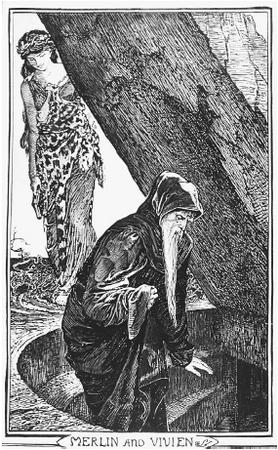AVALON
Avalon is the place where the legendary King Arthur was taken after receiving mortal wounds in battle. Although it is a mythical place, there are sites on which Avalon may well have been based.
Avalon is mentioned in a widely read text in History of the Kings of Britain (1138), written by Geoffrey of Monmouth (c. 1100–1154). Part fiction, part history, and partly based on Celtic folktales, Geoffrey's work was the first popular source to depict the exploits of King Arthur, a leader believed to have ruled in Britain during the fifth or sixth century. That era falls within the Dark Ages, a period after the Roman Empire retreated from northwestern Europe and the area was assailed by invaders from eastern Europe and Scandinavia. Not much is known about the history of that period.
Geoffrey's work helped bring attention to myths of the Celtic people, who were overwhelmed by Romans and then other invaders

After Arthur received mortal wounds in battle, he was tended to by a maiden and placed aboard a boat bound for Avalon. The location of Avalon, usually called an island, varies according to which of the many Arthurian tales is being read. Some sources suggest Avalon lies off the coast of Great Britain, or "across the sea," a term some have interpreted as the Atlantic Ocean, with Avalon possibly being the island of Greenland or a location in North America.
Geoffrey likely took the name from "Avallon," a Celtic term equivalent to "apple place." Celtic myths had identified a paradise in terms that translate to an "island of apples." The old Welsh language, where the word "Avallach" referred to a mythical island, is another possible source.
Arran, an island off the coast of Scotland, has been considered a possible model for Avalon. The name Arran derived from "Emhain of the Apple Trees." Another popular claim for the site of Avalon is Glastonbury, a longtime apple-growing area in England.
DELVING DEEPER
Gordon, Stuart. The Encyclopedia of Myths and Legends. London: Headline Books, 1993.
Harpur, James, and Jennifer Westwood. The Atlas of Legendary Places. New York: Konecky & Konecky, 1997.
Ingpen, Robert, and Philip Wilkinson. Encyclopedia of Mysterious Places. New York: Barnes & Noble, 1999.
Larousse Dictionary of World Folklore. New York: Larousse, 1995.

Comment about this article, ask questions, or add new information about this topic: